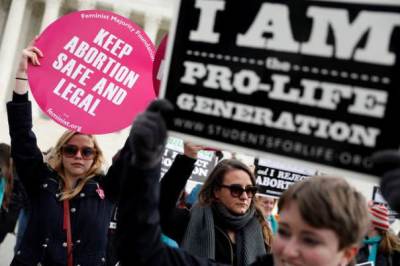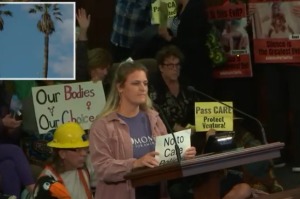The Third Way: Human Dignity and Christian Consistency

We have been tracing values that should drive Christian public square engagement, including political engagement. In the Third Way, the believer's citizenship in heaven involves a call to honor God with a distinctive kind of life. That way of living looks different than what we see in the world. Divinely rooted values should inform policy because values drive character as well as the choices we make. In short, character matters for choices Christians make because it reflects credibility for what Christians believe about what God asks of people and society, mirroring who their God is and thus his reputation. These values also model how life should be lived and discussed, along with how choices are made. They serve as a template for thinking through issues and moving us into discussion of specific policies as well as for the actions we undertake or support.
Many times these days policy is framed as a binary choice where we have to choose one way or the other. However, often this binary choice forces us into an inconsistency that undercuts our moral credibility. Perhaps this is best seen in a specific example. Let's consider human dignity as a value because thinking through human dignity shows the complexity of what believers face in their interactions these days.
The fact people are made in God's image gives every person value (Gen. 1:26-27). It is why God viewed murder as an offense worthy of a person losing his or her own life (Gen. 9:6). Whether one believes in God or not, one can recognize the intrinsic value of life and the dignity of every human being. The current outcry against how children have been gassed in Syria shows we understand this truth from our gut. Luke 6:38 speaks of the measure we use being used against us. In the end, it means believers understand that real divine justice one day will be administered by the only One who will judge with complete insight and balance. However we live in a fallen world where believers are called to serve to make it a better place and pursue a human justice that respects all life. This also means believers are to care about how all humans treat one another, as well as how they are seen and addressed.
All lives are sacred. This understanding of life is what stands behind the church's historical, social, and theological concern about abortion. Even though a growing child is dependent on their mother for initial support before birth, the child is still seen as a life God is weaving into existence (Ps. 139:13). There is more to life than chemistry and biology. A person has a soul that makes the mother a steward of the divinely imaged life within her. Her individual liberty does not nullify the rights or dignity of the child she carries. That baby is never an inconvenience.
However the prospect of birth is not the only issue where human dignity is in play. Human dignity never leaves the playing field of life. Once that child takes his or her first breath, human dignity comes alive in a more comprehensive public presence. What is the point of defending the preservation of life if we do not take seriously the quality of life after the child debuts into society. It is always relevant and as a result should always receive attention in the church. It means all people deserve respect. It is the premise from which the idea of equal justice comes. It is why the prophets condemn oppression. Justice is not a political idea, nor a product of social concern; it is a biblical idea rooted in human dignity and God's call to love one's neighbor as oneself.
In sum, human justice is a big idea because Christians should honor the quality of the life span of each sacred human being. It is why Jesus told the parable of the Good Samaritan because he stressed disciples should be neighbors to anyone in need and that neighbors could come in surprising packages, using a hated Samaritan as the prime example. He told the parable in such a way that he made it clear no one is excluded from being considered a neighbor (Luke 10:29-37). If we want to receive respect, we also should be willing to give it. Human justice is a matter of true love for our neighbor. Jesus put such caring love at the top of the list for the actions of those who follow him.
What this means is that we are not to choose between contending for a child in the womb or a person who is alive. Both concerns are moral. It means we are to advocate for the unborn child and also show compassion for justice out of regard for the human dignity of any person.
Today this choice is often posed as demanding one embrace one side or the other. The common juxtaposition is between pro-life and pro-choice. Given that scenario, the choice for human dignity means one should be pro-life. However another scenario is more complicated and may be the more biblically comprehensive way to consider the moral choices. It is between being pro-choice and caring about human justice once that child enters into life. In this binary one has to choose between support for being pro-life or support for justice. But these concerns are all pro-life and are rooted in a respect for the human dignity of all. Among believers we have people telling us to honor one or the other as a priority. Many times we are told one is moral and the other is political with the arrow of emphasis going in either direction in the argument depending on who is making the case. That choice, whether from the right or the left, is simply wrong. Human dignity is about quality of life wherever it resides. It knows no age, color, or geographic location.
The Third Way says both of these kinds of choices matter. The zeal one has to preserve a developing life should also fuel our concern for those fellow people who live as our neighbors or vice versa. To preserve a life but geographically break up a family that need not be broken up is wrong. To break a law or defend an imbalance in a poor law's application is equally wrong. To refuse to consider whether an existing law is really truly humane is an affront to a democracy that allows us to determine our laws and fix our injustices. There are ways to penalize lawbreakers without sending them into exile elsewhere. To think though the kind of penalty a violation deserves is not amnesty. Also there is a way to distinguish the innocent by stander to a broken law from the perpetrator. Yes, I have the Dreamers in mind here. There is also a lack of balance when penalties for crimes are applied in an excessive way to one race while others of another race get less for the same crime or for other significant violations in other areas. Yes, I have racial injustice in mind here. The application of justice is blind in a harmful way when this is the reality as it is for many today.
The binary choices our society often seeks to impose on us can short circuit the conversations we need to have about how to honor human dignity with consistency and a sense of fairness. When values are in tension, as is often the case in a fallen world, we need to discuss their relationship to each other, not force a one-sided choice between them. Sometimes pursuit of a middle ground is valuable, even needed. Mutually exclusive options can lead us to create a society that is more flawed in its inconsistencies, making us more divided than we need to be. The false dichotomy creates problems versus solving them.
Embracing human dignity consistently yields no prejudice through nationality, ethnicity, gender, or social status. Jesus spoke of loving our neighbor as one of the core commandments for a reason. At the core of that call is the human dignity God created in every person. That means wrestling through carefully considered policy avoids labeling people or unjustly generalizing about them in pursuit of a common good. It means we seek to preserve life and affirm a fairness in our laws and their appropriate penalties.
In all of this really listening is key. It means we do not form our rebuttal as someone speaks, but earnestly seek to hear what they are saying and why. It means we address people, even people with whom we disagree, with gentleness and respect (1 Pet. 3:13-18; Col. 4:5-6). It means we do not objectify people by painting them with a brush that represents the worst few, not the whole. It means engaging on things we disagree about, not through the abusing, demeaning, or belittling of the person with whom we differ. Yes, I have our all-to-frequent, hostile public rhetoric in mind here. I also have indifference to sexual abuse and infidelity in mind here. To defend such behavior, much less engage in it, undercuts what our faith stands for.
If we believe all life is sacred, how we conduct our discourse, treat people, and how we hold our positions matters. Human dignity means there should be no blind spots and as little inconsistency as is possible. Maybe the way to get there is not to cherry pick on human dignity by pursuing an either/or but a both/and. To value humanity means to be consistent in that advocacy from conception to death. That consistency is crucial for the credibility of the Third Way. It honors why God made us in his image and calls us to reflect his character as citizens of heaven.


























